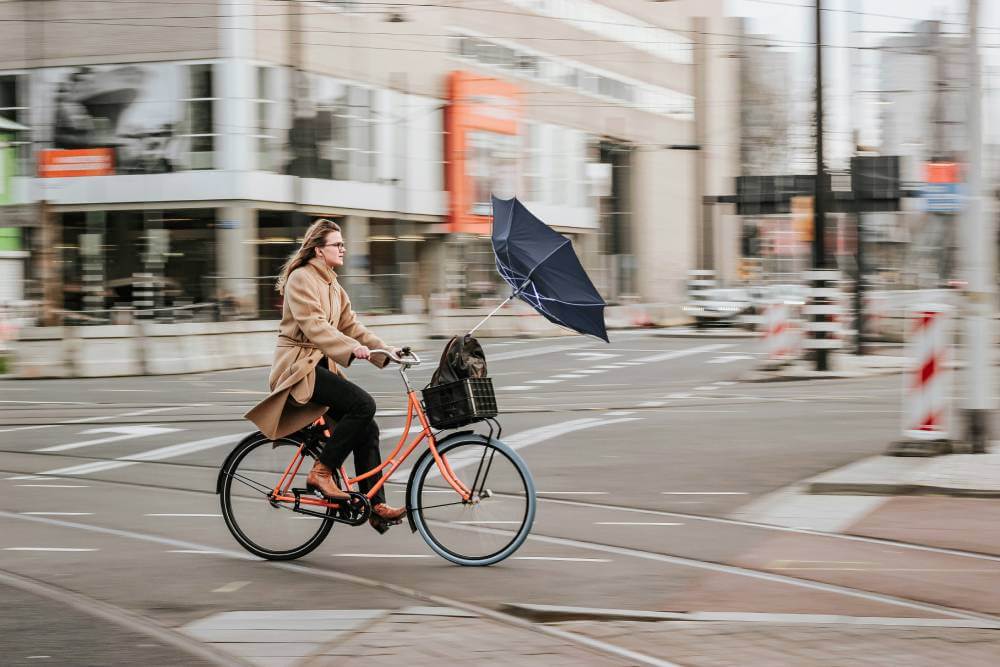The Hague, February 2025 – In a move that has sent shockwaves through the cycling capital of the world, the Dutch government has announced a controversial new policy: cyclists will be charged for using excessive wind assistance while riding. The law, dubbed the “Tailwind Tax”, aims to regulate what officials are calling “unfair aerodynamic advantages” in an already bike-dominated society.
Transport Minister Hans van der Fiets defended the measure, stating, “For too long, cyclists have been enjoying the benefits of wind without contributing to the national economy. If cars pay road tax and fuel tax, it’s only fair that cyclists pay their share when they’re basically getting free propulsion.”
How the Tax Works
The tax will be calculated based on wind speed, cyclist speed, and total distance traveled. Advanced “Wind-o-Meters” will be installed along major bike paths, measuring the assistance provided by the Dutch winds. The government has introduced the following tax rates:
- 0–10 km/h Wind Speed: No charge (you’re still working for it).
- 10–20 km/h Wind Speed: €0.05 per kilometer (mild assistance).
- 20–30 km/h Wind Speed: €0.15 per kilometer (strong assistance).
- 30+ km/h Wind Speed: €0.50 per kilometer (basically cheating).
Cyclists riding against the wind, however, will be eligible for wind subsidies, encouraging a fairer system. A special “Headwind Rebate” will be offered to students in Rotterdam, where biking to school against hurricane-level winds has been classified as an extreme sport.
Public Reaction
The response has been overwhelmingly furious. Cycling activists have taken to the streets—on foot, in protest—claiming that “taxing the wind is unnatural and goes against Dutch values.” One cyclist, covered in sweat, yelled, “If we pay for the wind, will we get refunds every time we have to bike against it?”
Meanwhile, Dutch racing cyclists are reportedly considering aerodynamic lawsuits, arguing that they “shouldn’t be punished for being efficient.” The Tour de France is monitoring the situation closely, worried that Dutch cyclists might start demanding wind credits internationally.
However, environmentalists support the initiative, arguing that it may encourage cyclists to generate their own energy instead of relying on nature. Some tech companies are already developing wind-neutral bicycles, equipped with tiny sails that fold in when a tailwind is detected.
International Response
- Germany responded by laughing for a solid 10 minutes before releasing an official statement: “Ja, okay, but what’s next? A tax on gravity?”
- France dismissed the tax entirely, stating that “the Dutch are already cycling too fast for our liking.”
- Denmark announced they are considering a “Bike Lane Congestion Fee”, but only for tourists who fail to keep up with Copenhagen’s aggressive cycling pace.
- Belgium expressed concern, fearing that this law might encourage Dutch cyclists to detour through Belgium to avoid the tax, increasing cross-border bike traffic.
What’s Next?
If the “Tailwind Tax” is successful, Dutch officials are reportedly considering other natural energy taxation policies, including:
- A “Canal Flow Charge” for boats that drift too easily with the current.
- A “Sunlight Tariff” for people enjoying too much free warmth on terraces.
- A “Rain Fee” for citizens using free rain showers instead of indoor plumbing.
For now, Dutch cyclists are left wondering if their daily commute will become a financial nightmare or if this is just another attempt by the government to keep them pedaling—both literally and financially.
One thing is certain: next time the wind is at their backs, they’ll be checking their wallets as well as their speedometers.
